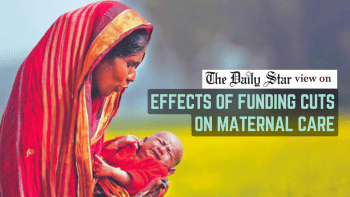Neonatal deaths must be prevented

Despite Bangladesh's significant progress in reducing the under-five child mortality rate over the years, our success in saving the lives of newborns is dismal. Neonatal deaths—or deaths within 28 days of birth—stand at 20 per 1,000 live births, which is far higher than the Sustainable Development Goal's 2030 target of 12 per 1,000 live births. A recent UN report on Bangladesh estimated that nearly two-thirds of over 100,000 children who died before their fifth birthday in 2023 passed away within 28 days of delivery.
One reason we fail to save our newborns is the lack of well-equipped Special Care Newborn Units (SCANUs) and Newborn Stabilisation Units (NSUs). These units have played a crucial role in saving many infants born with complications. However, a lack of maintenance and delays in replacing old and outdated machinery are limiting their effectiveness. Although the government is planning expansion by establishing more SCANUs and NSUs, the focus should be more on upgrading the existing ones and ensuring proper maintenance. Unfortunately, because of corruption in our healthcare system, obvious problems are often overlooked while resources get invested in less important areas. We can only hope that such practices will be avoided in the future.
Also, we should aspire to reduce the number of premature births, or births that lead to complications, in line with the adage "Prevention is better than cure." Among the leading causes of neonatal deaths are birth asphyxia and prematurity/low birthweight. These can be prevented if mothers can deliver in well-equipped primary healthcare centres that have on-duty, experienced birth attendants, or if the delivery is conducted by trained, certified, and skilled midwives. Unfortunately, we have not been able to ensure these services evenly across the country. Home deliveries still account for 30 percent of all births in Bangladesh. Additionally, malnutrition among mothers and shorter intervals between pregnancies—often the consequences of child marriage—can, and does, lead to neonatal deaths.
Therefore, the government must invest more in these areas to make primary healthcare more accessible, ensure proper nourishment of adolescent girls, prevent early marriages, and raise awareness about the importance of properly spaced pregnancies. Preventing neonatal deaths is crucial for the country's future, as every child saved today may be an asset for tomorrow.


 For all latest news, follow The Daily Star's Google News channel.
For all latest news, follow The Daily Star's Google News channel. 









Comments